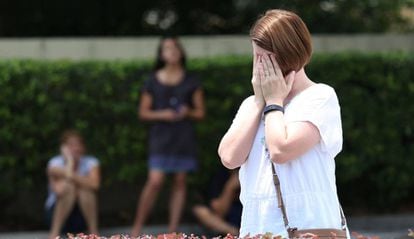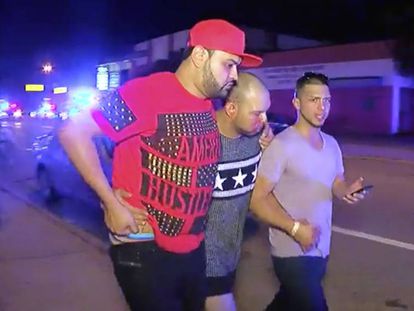Most victims in Orlando shooting were of Hispanic descent
Relatives of the missing are waiting for news as they hold on to hope, and grapple with uncertainty and pain

As family members huddle together and talk in front of Beardall Senior Center, one of the locations where they can go to ask about relatives whom they believe may have been involved in the Orlando shooting on Sunday morning, their words are laced with doubt: should they speak in the present or past tense about their loved ones? They oscillate between fear that their relatives are dead and hope that they have been spared. And from time to time, an intense pain takes hold: relatives emerge from the center completely distraught and numb, after officials tell them their loved one is among the dead. Police and medics meet them outside and try to console them.
Orlando has a large Puerto Rican community and most of the center’s staff are from the island. Authorities have identified 21 of the 50 people who died. Most of them were Latinos, aged between 20 and 50, including security guards who worked at the nightclub, pharmacy students, Universal amusement park employees and travel agents. The shooting, the deadliest massacre America has seen since the September 11 attacks, took place in the early hours of Sunday at Pulse, a popular nightclub within the gay community. Pulse was hosting Latino night on Saturday.
The victims included security guards who worked at the nightclub, pharmacy students, Universal amusement park employees and travel agents
Maribel Mejía, a 21-year-old woman born in the Dominican Republic who grew up in Puerto Rico and who has lived in Florida most of her life, says 10 of her friends were at the club that night. One of them was killed, she says. She does not know anything else about the others and it is eating away at her. “Everything is uncertain. We are on hold.”
Her friend, Eric Ortiz, a 30-year-old Puerto Rican man who worked at a gift shop, “was a very happy guy.” “He liked to go out a lot, we ate in together a lot,” Mejía says in front of the center on Sunday. “He was a very close friend, we spent a lot of time together and he was very happy because he had just gotten married after they passed the law in Florida [allowing same-sex marriage].” His husband was not at the club. Mejía says about 98 percent of the nearly 300 people who were at Pulse the night of the shooting were Latinos, mostly Puerto Ricans, Dominicans and Venezuelans. All of her missing friends are Puerto Ricans and long-time Florida residents, including the groomsman at her wedding, a well-known Orlando stylist.
Danny Concepción, a 47-year-old Puerto Rican man, has come to ask for information about his 50-year-old cousin, who went to the club with her 22-year-old son. Orlando officials say her cousin is not on the list of the 53 wounded, which means that, though there is no official announcement yet, she is dead.
“She was a single mother raising two sons, a 10-year-old and an 11-year-old who lived with her,” Concepción says. She had five other children from other relationships and she was close with the son whom she accompanied to the nightclub. He was gay and she wanted to be part of his world. “She never judged him,” Concepción says. The son has survived the attack but he saw his mother get shot at the club.
Danny Concepción, a 47-year-old Puerto Rican man, has come to ask for information about his 50-year-old cousin
Karina’s 25-year-old brother is not on the list of wounded either but she does not want to give up hope. Her brother worked at an apartment rental company. “He liked music, he liked to dance, a very good person, he has a good heart. I have faith that if he is not alive, the Lord has him in his glory, that he has met Jesus and he is well in Jesus’ arms, and if he is alive then thank God because he gave him a new opportunity at life,” she says. “You keep having faith until the last moment,” she continues. “I am trying to prepare myself in case the news is not what I want it to be.”
Steve, a 35-year-old Puerto Rican man, echoes Karina’s feelings. His 25-year-old brother “was always happy, self-assured, hard working.” Steve speaks carefully, in present tense: “He likes... He liked... I’m saying he likes because he’s alive.” And then he stops speaking.
English version by Dyane Jean François.
Sign up to our newsletter
EL PAÍS English Edition has launched a weekly newsletter. Sign up today to receive a selection of our best stories in your inbox every Saturday morning. For full details about how to subscribe, click here.











































